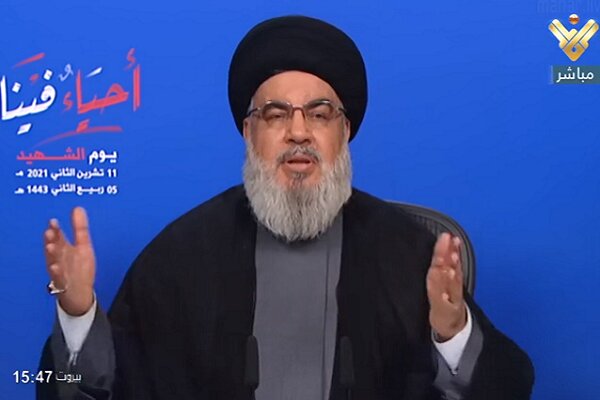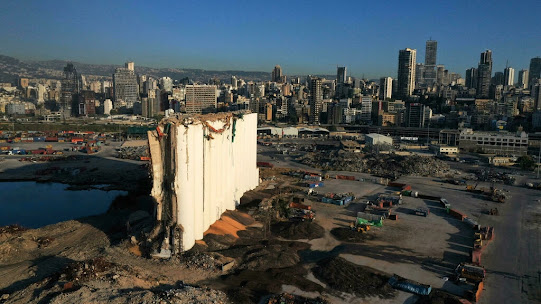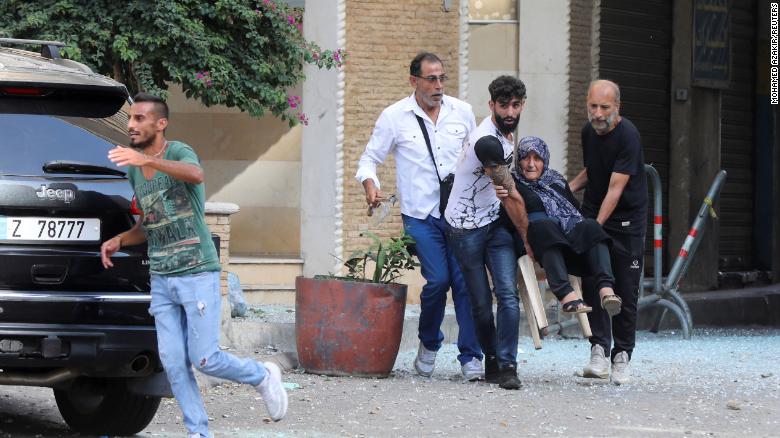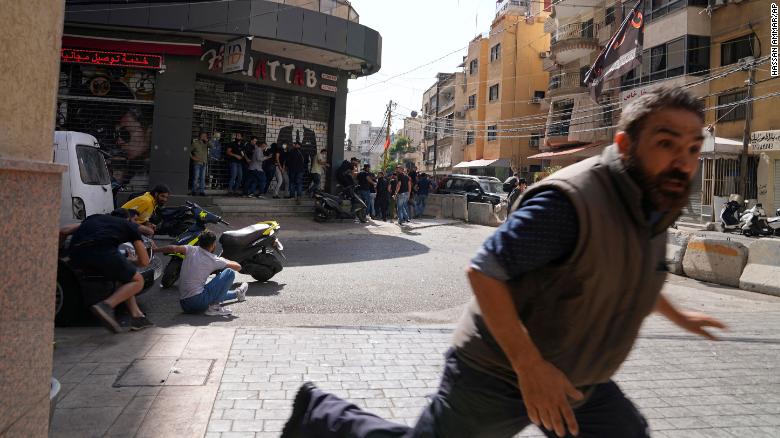
Children search for valuables in the garbage next to a market in Beirut, Lebanon, Monday, April 12, 2021. Lebanon's severe economic crisis that threw much of the population into poverty is dramatically affecting children leaving some go to bed hungry, lack good medial care and drop out of school to help their families, UNICEF, the U.N. children's agency said Tuesday, Nov. 23, 2021. (AP Photo/Hassan Ammar, File)
BEIRUT (AP) — A small group of protesters broke into a ministry building in Beirut early on Friday and removed a photo of the president from one of its main rooms, as the Lebanese pound hit a new low amid a worsening economic and political stalemate.
The protesters who entered the Ministry of Social Affairs said conditions in crisis-hit Lebanon have become unbearable as a result of the rapid economic collapse and ongoing crash of the pound, which reached 25,100 to the dollar. The previous record was 25,000.
Prices have been skyrocketing in recent weeks as the government lifted subsidies on fuel and some medicines, making them out of reach for many in Lebanon. Some three quarters of the population of 6 million, including a million Syrian refugees, now live in poverty. The minimum monthly wage is now worth about $27.
Protesters have blamed the ministry for sluggishness in issuing ration cards that are supposed to give poor families monthly financial aid.
The protesters broke into the meeting room at the ministry and turned a framed picture of President Michel Aoun upside down before removing it. They replaced it with a banner in Arabic that read “revolutionaries of October 17.”
The protesters were referring to the start of nationwide protests in October 2019 against the country’s ruling class. They are blamed for decades of corruption and mismanagement that threw the small nation into the worst economic and financial crisis in its modern history.
“Those who usurped public money cannot conduct reforms,” shouted one of the protesters before leaving the building following police intervention. “We have hit rock bottom. Things cannot get worse.”
The crisis has been made worse by the coronavirus and the August 2020 explosion in Beirut’s port that killed 216 people, injured more than 6,000 and destroyed parts of the capital.
The Cabinet, formed in September after a 13-month vacuum, has not met in more than six weeks amid deep divisions between rival groups over the judge leading the investigation into the port blast. Comments by a government minister that triggered a diplomatic row with oil-rich Gulf Arab nations have added to the acrimony.
In other parts of the country, protesters placed posters that read “the mafia that destroyed the Lebanese pound” outside some branches of local banks, the state-run National News Agency said.
For the past two years, local lenders have imposed informal capital controls that prevent many people from accessing their savings.








:quality(70)/cloudfront-eu-central-1.images.arcpublishing.com/thenational/7T5F4YQYEQBVKNU5YZSQQ5VIV4.jpg)
:quality(70)/s3.amazonaws.com/arc-authors/thenational/0c776a17-4aec-4e4c-95b2-489017fb7875.png)
:quality(70)/cloudfront-eu-central-1.images.arcpublishing.com/thenational/DWZPSM45VZFT4FXEGOSQOQ6H34.jpg)
:quality(70)/cloudfront-eu-central-1.images.arcpublishing.com/thenational/TLNWH3VCLUPIGEDXWWQ2BPM4FA.jpg)
:quality(70)/cloudfront-eu-central-1.images.arcpublishing.com/thenational/4C6FCDMEQQAMEO2KMDIFBMCW7A.jpg)
:quality(70)/cloudfront-eu-central-1.images.arcpublishing.com/thenational/PSWKK37PALBM4EIONZSRLOMAQ4.jpg)
:quality(70)/cloudfront-eu-central-1.images.arcpublishing.com/thenational/BGTZGGZXHTWHB5LUSHSSUCNXOY.jpg)
:quality(70):focal(3967x1565:3977x1575)/cloudfront-eu-central-1.images.arcpublishing.com/thenational/4WEQMWNPQELRFVRFLGORMJMIL4.jpg)
:quality(70)/cloudfront-eu-central-1.images.arcpublishing.com/thenational/VNO2BRIXQPWAGRTTH5VRM7CORQ.jpg)
:quality(70)/cloudfront-eu-central-1.images.arcpublishing.com/thenational/A655IS7LE7CBJDHTLBCSQ3PECY.jpg)
:quality(70)/cloudfront-eu-central-1.images.arcpublishing.com/thenational/AA3W34T6GLCYHWLVD4U6AJX7VM.jpg)
:quality(70)/cloudfront-eu-central-1.images.arcpublishing.com/thenational/ORKIV6RZWXCTHDT2LULCBXX52Y.jpg)
:quality(70):focal(-5x-5:5x5)/cloudfront-eu-central-1.images.arcpublishing.com/thenational/2QTOLXASPGRVTESHZOUOOFAVXU.jpg)
:quality(70)/cloudfront-eu-central-1.images.arcpublishing.com/thenational/2GA3JA4XNUBJ3ED5NQPOGVHYD4.jpg)
:quality(70)/cloudfront-eu-central-1.images.arcpublishing.com/thenational/Y6OMWWFJ2RUGJ7BX7VUODWMUHI.jpg)
:quality(70)/cloudfront-eu-central-1.images.arcpublishing.com/thenational/H5QVJB3OO6R3LSF2MVIGSDQ7PY.jpg)
:quality(70)/cloudfront-eu-central-1.images.arcpublishing.com/thenational/2OSCRGMATC2YADRKXO262UH22Q.jpg)
:quality(70)/cloudfront-eu-central-1.images.arcpublishing.com/thenational/PK5RA4XJXRTJYVHDXELJ5KEWII.jpg)
:quality(70)/cloudfront-eu-central-1.images.arcpublishing.com/thenational/7NPXZFE37KX2JTSHQQ2C3LY53M.jpg)
:quality(70)/cloudfront-eu-central-1.images.arcpublishing.com/thenational/EHIYVX3Z7MM2JRX6BQCTBZJZ3A.jpg)
:quality(70)/cloudfront-eu-central-1.images.arcpublishing.com/thenational/ZL2IKALB477XCWAW4SROOWVVVA.jpg)
:quality(70)/cloudfront-eu-central-1.images.arcpublishing.com/thenational/OWEN7VPWUWMRNOFDP4XAXALVJQ.jpg)
:quality(70)/cloudfront-eu-central-1.images.arcpublishing.com/thenational/EQZOVI6YX5FFTZZ6ZU2A26NATQ.jpg)
:quality(70)/cloudfront-eu-central-1.images.arcpublishing.com/thenational/3TKFPCDS5EUDJ2BFINAUXOQ4ZQ.jpg)
:quality(70)/cloudfront-eu-central-1.images.arcpublishing.com/thenational/FIKXSWMFZDAWX2VPFWTO7Q4CXQ.jpg)
:quality(70)/cloudfront-eu-central-1.images.arcpublishing.com/thenational/KI6Z52Y6FLJW6QV5XKDZZB2FBI.jpg)
:quality(70)/cloudfront-eu-central-1.images.arcpublishing.com/thenational/NU6DFGNXKO3TQUEQ4ZVKISD7NU.jpg)
:quality(70)/cloudfront-eu-central-1.images.arcpublishing.com/thenational/IF32D33BQXT3TSLTPR2L6DYDGI.jpg)
:quality(70)/cloudfront-eu-central-1.images.arcpublishing.com/thenational/MLCJQLE7VUYRHC26K2EQX7E6GA.jpg)
:quality(70)/cloudfront-eu-central-1.images.arcpublishing.com/thenational/S6SJ6OJDAZTEURIJNOBVDXSQRE.jpg)
:quality(70)/cloudfront-eu-central-1.images.arcpublishing.com/thenational/6QEELNRZNBQXEHLIHZHRL67PII.jpg)
:quality(70)/cloudfront-eu-central-1.images.arcpublishing.com/thenational/LHPWETGHMFWSDO6NREKGZ4AFZ4.jpg)



